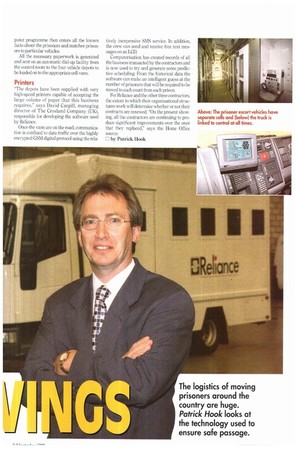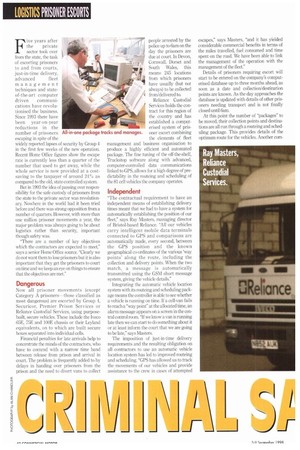The logistics of moving prisoners around the country are huge.
Page 45

Page 44

If you've noticed an error in this article please click here to report it so we can fix it.
Patrick Hook looks at the technology used to ensure safe passage.
Five years after
the private sector took over from the state, the task of escorting prisoners to and from courts, just-in-time delivery, advanced fleet management techniques and stateof-the-art computer driven communications have revolutionised the business. Since 1993 there have been year-on-year reductions in the number of prisoners escaping in spite of the widely reported lapses of security by Group 4 in the first few weeks of the new operation. Recent Home Office figures show the escape rate is currently less than a quarter of the number that used to get away, while the whole service is now provided at a costsaving to the taxpayer of around 24% as compared to the old, state-controlled system.
But in 1993 the idea of passing over responsibility for the safe custody of prisoners from the state to the private sector was revolutionary. Nowhere in the world had it been tried before and there was strong opposition from a number of quarters. However, with more than one million prisoner movements a year, the major problem was always going to be about logistics rather than security, important though safety was.
"There are a number of key objectives which the contractors are expected to meet," says a senior Home Office source. "Clearly we do not want them to lose prisoners but it is also important that they get the prisoners to court on time and we keep an eye on things to ensure that the objectives are met."
Dangerous
Now all prisoner movements (except Category A prisoners—those classified as most dangerous) are escorted by Group 4, Securicor, Premier Prison Services or Reliance Custodial Services, using purposebuilt, secure vehicles. These include the Iveco 65E, 75E and 100E chassis or their Leyland equivalents, on to which are built secure boxes separated into individual cells.
Financial penalties for late arrivals help to concentrate the minds of the contractors, who have to contend with a narrow time band between release from prison and arrival in court. The problem is frequently added to by delays in handing over prisoners from the prison and the need to divert vans to collect people arrested by the police up to 6am on the day the prisoners are due at court In Devon, Cornwall, Dorset and South Wales, this means 245 locations from which prisoners have usually (but not always) to be collected from/delivered to.
Reliance Custodial Services holds the contract for this region of the country and has established a computerised system of prisoner escort combining the elements of fleet management and business organisation to produce a highly efficient and automated package. The fine tuning of the off-the-shelf, Truckstop software along with advanced, computer-controlled data communications linked to GPS, allows for a high degree of predictability in the routeing and scheduling of the 81 cell vehicles the company operates.
Independent
"The contractual requirement to have an independent means of establishing delivery times meant that we had to have a system for automatically establishing the position of our fleet," says Ray Masters, managing director of Bristol-based Reliance. "All our vehicles carry intelligent mobile data terminals connected to GPS and comparisons are automatically made, every second, between the GPS position and the known geographical co-ordinates of the various 'way points' along the route, including the collection and delivery points. When the two match, a message is automatically transmitted using the GSM short message system, giving the vehicle details."
Integrating the automatic vehicle location system with its muteing and scheduling package means the controller is able to see whether a vehicle is running on time. If a cell-van fails to reach a "way point" at the allocated time, an alarm message appears on a screen in the central control room. "If we know a van is running late then we can start to do something about it or at least inform the court that we are going to be late," says Masters.
The imposition of just-in-time delivery requirements and the resulting obligation on all contractors to use an automatic vehicle location system has led to improved mincing and scheduling. "GPS has allowed us to track the movements of our vehicles and provide assistance to the crew in cases of attempted escapes," says Masters, "and it has yielded considerable commercial benefits in terms of the miles travelled, fuel consumed and time spent on the road. We have been able to link the management of the operation with the management of the fleet."
Details of prisoners requiring escort will start to be entered on the company's computerised database up to three months ahead, as soon as a date and collection/destination points are known, As the day approaches the database is updated with details of other prisoners needing transport and is not finally closed until flam.
At this point the number of "packages" to be moved, their collection points and destinations are all run through a muteing and scheduling package. This provides details of the optimum route for the vehicles. Another corn puter programme then enters all the known facts about the prisoners and matches prisoners to particular vehicles.
All the necessary paperwork is generated and sent on an automatic dial-up facility from the control room to the four vehicle depots to be loaded on to the appropriate cell-vans.
Printers
Thc depots have been supplied with very high-speed printers capable of accepting the large volume of paper that this business requires," says David Cargill, managing director of The Crosland Company (UK), responsible for developing the software used by Reliance.
Once the vans are on the road, communication is confined to data traffic over the highly encrypted GSM digital protocol using the rela
tively inexpensive SMS service. In addition, the crew can send and receive free text messages on an LCD.
Computerisation has created records of all the business transacted by the contractors and is now used to try and generate some predictive scheduling. From the historical data the software can make an intelligent guess at the number of prisoners that will be required to be moved to each court from each prison.
For Reliance and the other three contractors, the extent to which their organisational structures work will determine whether or not their contracts are renewed. "On the present showing, all the contractors are continuing to produce significant improvements over the ones that they replaced," says the Home Office source.
0 by Patrick Hook












































































































